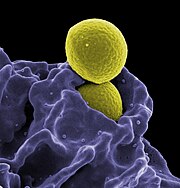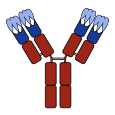
Back Immunologie Afrikaans Immunologie ALS علم المناعة Arabic Inmunoloxía AST İmmunologiya Azerbaijani Імуналогія Byelorussian Імуналёгія BE-X-OLD Имунология Bulgarian Imunologija BS Immunologia Catalan
 MRSA (yellow) enguled by neutrophil (purple) Photo Source: National Institute of Allergy and Infectious Diseases | |
| System | Immune |
|---|---|
| Subdivisions | Genetic (Immunogenetics) |
| Significant diseases | Rheumatoid arthritis Inflammation |
| Significant tests | |
| Specialist | Immunologist |
 |
| Immunology |
|---|
Immunology is a branch of biology and medicine[1] that covers the study of immune systems[2] in all organisms.
Immunology charts, measures, and contextualizes the physiological functioning of the immune system in states of both health and diseases; malfunctions of the immune system in immunological disorders (such as autoimmune diseases, hypersensitivities,[3] immune deficiency,[4] and transplant rejection[5]); and the physical, chemical, and physiological characteristics of the components of the immune system in vitro,[6] in situ, and in vivo.[7] Immunology has applications in numerous disciplines of medicine, particularly in the fields of organ transplantation, oncology, rheumatology, virology, bacteriology, parasitology, psychiatry, and dermatology.
The term was coined by Russian biologist Ilya Ilyich Mechnikov,[8] who advanced studies on immunology and received the Nobel Prize for his work in 1908 with Paul Ehrlich "in recognition of their work on immunity". He pinned small thorns into starfish larvae and noticed unusual cells surrounding the thorns. This was the active response of the body trying to maintain its integrity. It was Mechnikov who first observed the phenomenon of phagocytosis,[9] in which the body defends itself against a foreign body. Ehrlich accustomed mice to the poisons ricin and abrin. After feeding them with small but increasing dosages of ricin he ascertained that they had become "ricin-proof". Ehrlich interpreted this as immunization and observed that it was abruptly initiated after a few days and was still in existence after several months.
Prior to the designation of immunity,[10] from the etymological root immunis, which is Latin for 'exempt', early physicians characterized organs that would later be proven as essential components of the immune system. The important lymphoid organs of the immune system are the thymus,[11] bone marrow, and chief lymphatic tissues such as spleen, tonsils, lymph vessels, lymph nodes, adenoids, and liver. However, many components of the immune system are cellular in nature, and not associated with specific organs, but rather embedded or circulating in various tissues located throughout the body.
- ^ Fossen C. "What is Biology?". www.ntnu.edu. Retrieved 2018-07-25.
- ^ Villani AC, Sarkizova S, Hacohen N (April 2018). "Systems Immunology: Learning the Rules of the Immune System". Annual Review of Immunology. 36 (1): 813–42. doi:10.1146/annurev-immunol-042617-053035. PMC 6597491. PMID 29677477.
- ^ "Hypersensitivities | Microbiology". courses.lumenlearning.com. Retrieved 2018-07-25.
- ^ "Specific Disease Types | Immune Deficiency Foundation". primaryimmune.org. Retrieved 2018-07-25.
- ^ "Transplant rejection: MedlinePlus Medical Encyclopedia". medlineplus.gov. Retrieved 2018-07-25.
- ^ Pierce CW, Solliday SM, Asofsky R (March 1972). "Immune responses in vitro. IV. Suppression of primary M, G, and A plaque-forming cell responses in mouse spleen cell cultures by class-specific antibody to mouse immunoglobulins". The Journal of Experimental Medicine. 135 (3): 675–97. doi:10.1084/jem.135.3.675. PMC 2139142. PMID 4536706.
- ^ Miyahara S, Yokomuro K, Takahashi H, Kimura Y (November 1983). "Regeneration and the immune system. I. In vitro and in vivo activation of lymphocytes by liver regeneration and the role of Kupffer cells in stimulation". European Journal of Immunology. 13 (11): 878–83. doi:10.1002/eji.1830131104. PMID 6227489. S2CID 22400759.
- ^ "Ilya Ilyich Mechnikov (Elie Metchnikoff) (1845–1916)". The Embryo Project. Arizona State University.
- ^ "Phagocytosis: Definition, Process, & Examples". Encyclopedia Britannica. Retrieved 2018-07-25.
- ^ "Definition of immunity in English". Oxford Dictionaries. Archived from the original on July 25, 2018.
- ^ Lee DK, Hakim FT, Gress RE (October 2010). "The thymus and the immune system: layered levels of control". Journal of Thoracic Oncology. 5 (10 Suppl 4): S273–76. doi:10.1097/JTO.0b013e3181f20474. PMC 2951290. PMID 20859118.
© MMXXIII Rich X Search. We shall prevail. All rights reserved. Rich X Search